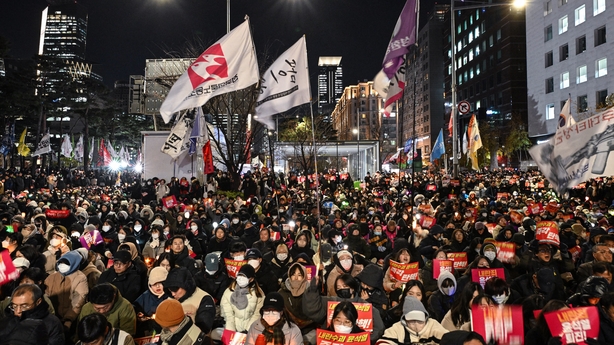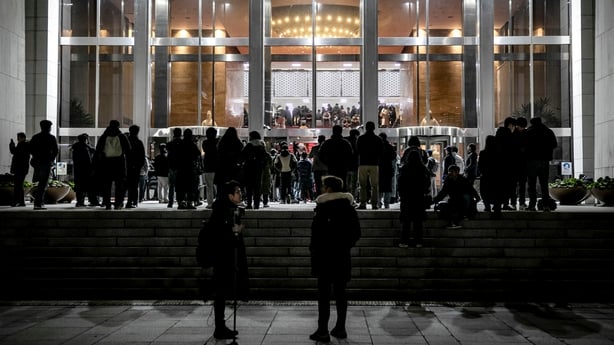South Korea's ruling party leader said President Yoon Suk Yeol needed to be removed from power for trying to impose martial law, increasing the pressure on him to quit even though members of his People Power Party reaffirmed its formal opposition to his impeachment.
Tomorrow, politicians will vote on the main opposition Democratic Party's motion to impeach Yoon, who shocked the nation when he gave the military sweeping emergency powers in order to root out what he called "anti-state forces" and overcome obstructionist political opponents.
Mr Yoon rescinded the declaration about six hours later after parliament, including some members of his party, voted to oppose the decree.
The conservative PPP has vowed to oppose the impeachment bill, a position it reaffirmed following a lengthy meeting of its politicians - at least some of whom would need to back it for the motion to succeed.
Mr Yoon said he would listen to the party's concerns, a PPP spokesperson told reporters.
Acting Defence Minister Kim Seon-ho said reports that had swirled throughout that there might be another attempt to impose martial law were not true.

PPP leader Han had earlier added fuel to those rumours, and suggested the party's stance on impeachment might be shifting, when he said there was "a high risk of extreme actions such as this emergency martial law being repeated" while Mr Yoon remained in power.
He also cited "credible evidence" that Mr Yoon had Intended to arrest and detain political leaders at Gwacheon, just south of Seoul, and called for Mr Yoon's "immediate suspension".
Some PPP members urged Mr Yoon to resign before the vote, saying they did not want a repeat of the 2016 impeachment of then-President Park Geun-hye, who left office following months of candlelit protests over an influence-peddling scandal.
Her downfall triggered the implosion of the party and a victory by liberals in presidential and general elections.
In scenes reminiscent of those protests, thousands of demonstrators holding candles assembled outside parliament demanding Yoon's impeachment.
Mr Yoon not seen in public
To succeed, an impeachment bill would need support from two-thirds of the 300-member assembly.
Mr Yoon's party has 108 legislators, so eight would have to side with the opposition for the bill to pass.
The South Korean leader has not been seen in public since rescinding martial law early on Wednesday and did not attend the PPP meeting today.
Following media reports Mr Yoon was on his way to parliament during the day, opposition politicians had poured out to the main lobby of the parliament building and set up a scrum to block him if he came.
The assembly speaker asked Mr Yoon not to come to parliament, even if he planned to, and said his office would take steps to prevent him from reaching the assembly.
Mr Yoon's office denied any such plans.

Police have launched investigations into the president and Kim Yong-hyun, the defence minister who allegedly encouraged him to declare martial law and who has since resigned.
The defence ministry said three army commanders were suspended, while military prosecutors were seeking to bar 10 officers from travelling overseas.
'Unconstitutional details" were slowly emerging about the chaos that engulfed South Korea following Mr Yoon's surprise declaration, which stirred painful memories of the country's long years of military rule following World War Two.
Read the latest stories from around the world
The National Election Commission said in a statement that around 300 martial law forces had entered premises under its control across the country following Mr Yoon's shock announcement.
"The occupation of the National Election Commission, an independent organisation under the constitution, is a clear unconstitutional and illegal act," the statement said.
Mr Yoon's approval rating plunged to a new low of 13%, according to the latest Gallup Korea poll.

